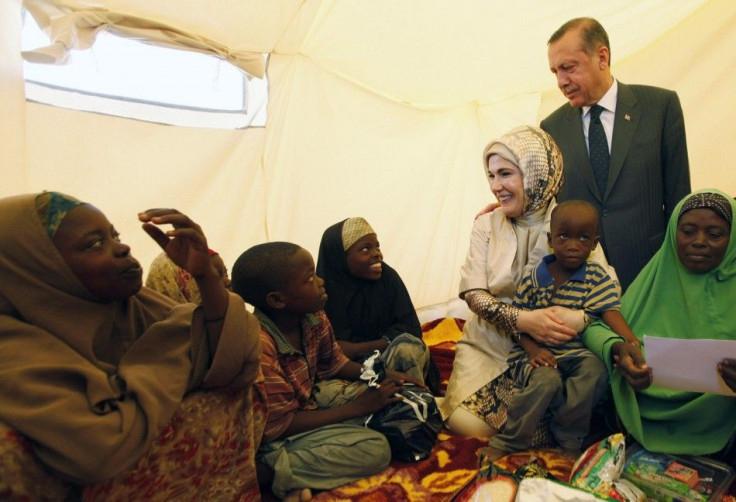Somalia Famine: Turkish PM to Open Embassy in Mogadishu

Turkish Prime Minister Recep Tayyip Erdogan arrived in famine-struck Somalia on Friday, where he was welcomed by Somalia's President Sheikh Sharif Ahmed.
Ahmed led Erdogan through the capital of Mogadishu, where they visited a camp for displaced persons.
Erdogan was accompanied by his Foreign Minister, Ahmet Davutoglu, as well as his wife and daughter. The statesman's visit is being heralded as a much needed gesture of support for a country which has long been suffering from the worst humanity crisis in decades.
The tragedy going on here is a test for civilization and contemporary values, Erdogan told reporters, Agence France Presse news agency reports.
The Turkish public has raised $115 million to aid Somalia, and Erdogan's presence may encourage other nations to step-up contributions. Earlier this month, the United Nations said that another $2.5 billion in aid was required to help the 12 million people suffering in the country.
On Thursday, Turkey and a number of Muslim nations pledged a total of $350 million to Somalia. Erdogan also stated that he would like to open an embassy in Mogadishu to help deliver assistance.
The Turkish president is the first non-African politician to visit Mogadishu in nearly 20 years. The Somali capital, as well as many parts of the country, has been rife with unrest, largely thanks to an ineffectual government which has made room for warlords to operate. Until recently, Mogadishu was essentially under the control of al-Shabaab, an al-Qaeda liked militant group.
There was a perception that nobody can go to Mogadishu; we try to destroy the perception. We came - many others can come,” Davutoglu stated.
Earlier this month, joint African Union and Somali forces drove al-Shabaab out of Mogadishu, although the rebels promised to return.
Famine has been declared in five regions of the country, meaning that in the areas at least 20 percent of households in an area face extreme food shortages with a limited ability to cope, and malnutrition rates have exceeded 30 percent.
A total of 12.4 million people in Somalia require immediate assistance, according to the U.N. Office for the Coordination of Humanitarian Affairs, and the number of people needing lifesaving humanitarian assistance could reach 15 million before the situation begins to turn around.
The current famine is the worst humanitarian disaster in Africa in two decades. The last time there was a famine on a similarly large-scale was in 1991-1992; it also occurred in Somalia.
© Copyright IBTimes 2025. All rights reserved.





















